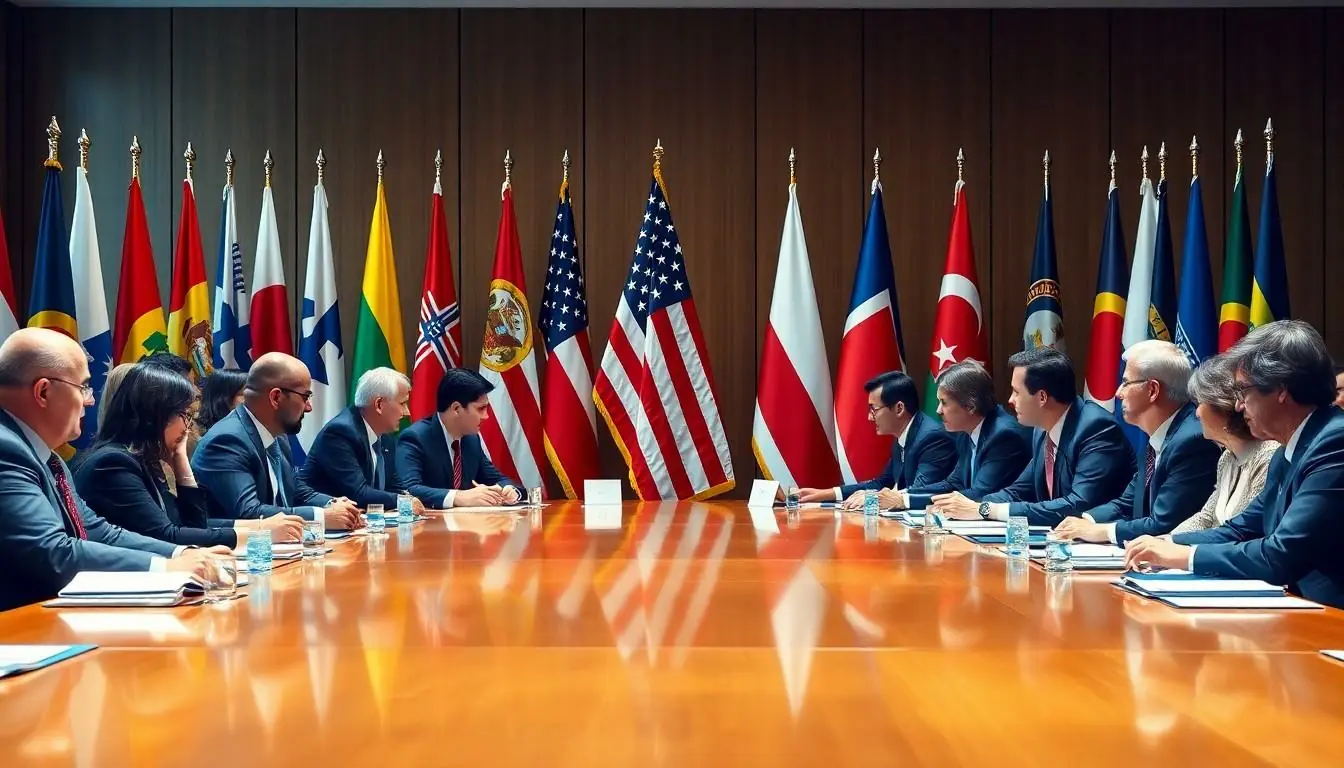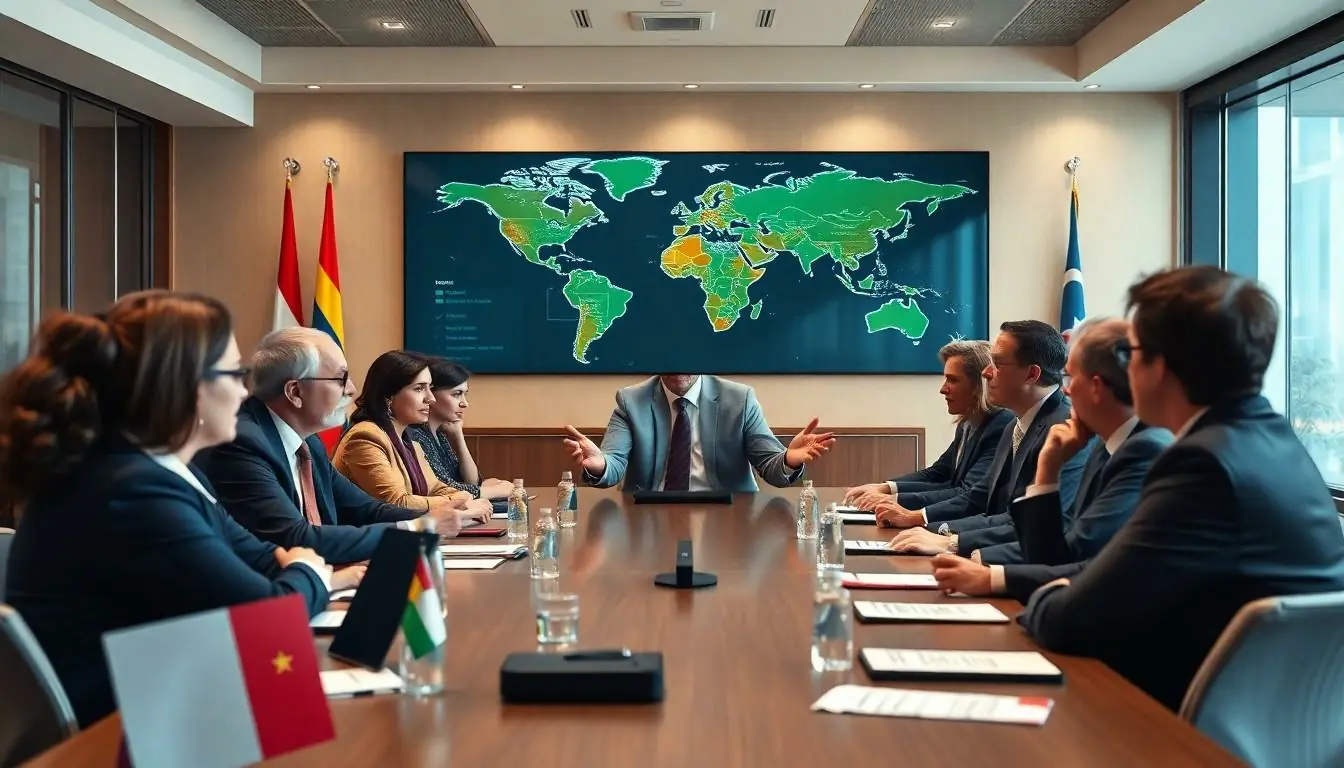Table of Contents
ToggleIn a world where diplomacy can feel like a game of chess played with live grenades, understanding international relations theory is more crucial than ever. It’s the secret sauce that helps decode the complex interactions between nations, guiding leaders through the minefield of global politics. Whether it’s alliances, conflicts, or trade agreements, these theories offer insights that can turn a diplomatic disaster into a success story.
Imagine trying to navigate a crowded party without knowing the guest list. International relations theory is that handy guide that helps avoid awkward encounters and ensures you know who’s who in the geopolitical zoo. From realism to liberalism, each theory brings its own flavor to the table, making the study of global affairs not just essential but also surprisingly entertaining. So buckle up and get ready to dive into the fascinating world of international relations theory, where every twist and turn could reshape our future.
Overview of International Relations Theory
International relations theory encompasses various frameworks that help analyze interactions among states and non-state actors. One prominent approach is realism, which emphasizes power and national interests. Realists argue that states operate in an anarchic international system, where survival is paramount. Consequently, military strength and economic resources play crucial roles in shaping foreign policy.
Liberalism, another significant theory, proposes that cooperation among states leads to mutual benefits. Liberals highlight the importance of international institutions and interdependence in reducing conflicts. Through trade agreements and diplomatic engagements, states can achieve collective security and prosperity.
Constructivism adds a different perspective by focusing on social constructs and identities. This theory posits that the international system is shaped by shared beliefs and norms. Language, culture, and historical contexts significantly influence state behavior under this framework.
Institutionalism emphasizes the role of international organizations in fostering cooperation. Institutions create expectations for state behavior, thus reducing uncertainty. By establishing rules and norms, these organizations facilitate dialogue and promote peaceful conflict resolution.
Critical theories, such as feminism and post-colonialism, challenge the traditional perspectives of international relations. They investigate how gendered and colonial dynamics influence global politics. By addressing issues of power and inequality, these theories broaden the scope of international relations analysis.
Overall, international relations theory provides a comprehensive understanding of global interactions. The application of these various perspectives aids scholars and practitioners in analyzing current events and predicting future trends in international affairs.
Key Theories in International Relations

Understanding the key theories in international relations offers insights into global political dynamics. Different frameworks address various aspects of state behavior and interaction.
Realism
Realism centers on the concept of power. It posits that states act primarily in their national interest. In this anarchic international system, military strength and strategic advantage dominate state decisions. Leaders prioritize security and survival above all else. The competitive nature of international politics drives states to seek power and influence, often at the expense of cooperation. Prominent theorists like Hans Morgenthau and Kenneth Waltz significantly shaped realism, emphasizing how human nature and state behavior intertwine in a struggle for dominance.
Liberalism
Liberalism advocates for cooperation among states. This theory highlights the importance of international institutions to foster collaboration and peace. It argues that economic interdependence and democracy contribute to global stability. States achieve better outcomes through diplomatic engagement rather than military conflict. Key figures such as Robert Keohane and Joseph Nye emphasize the role of non-state actors, including international organizations and multinational corporations. Shared values and international norms also play a crucial role in promoting harmony and mutual benefit.
Constructivism
Constructivism focuses on the impact of social constructs. It argues that state identities and interests are shaped by historical context and societal norms. States interact based on the perceptions and meanings they assign to each other. The theory underscores the influence of culture and ideology in international relations. Notable scholars like Alexander Wendt illustrate how collective beliefs can alter state behavior. Constructivism emphasizes that understanding global politics requires analyzing these underlying social factors and their evolution over time.
Critiques of International Relations Theory
International relations theory faces critiques that highlight its limitations and the need for emerging perspectives. These critiques address assumptions made by traditional approaches.
Limitations of Traditional Theories
Traditional theories often overlook the complexities of global dynamics. Realism’s focus on power neglects non-state actors’ roles, such as multinational corporations and NGOs. Liberalism’s reliance on institutions doesn’t account for failures in cooperation during crises. Moreover, constructivism may lack clear methodological frameworks, leading to ambiguous conclusions. Critics argue that such frameworks fail to explain the nuances of contemporary conflicts and the impact of globalization, ultimately limiting their applicability in real-world situations.
Emerging Perspectives
Scholars increasingly advocate for alternative approaches within international relations. Feminist theories emphasize the importance of gender and how it influences global power structures. Post-colonialism critiques Western-centric narratives, highlighting how colonial histories shape current geopolitical realities. Additionally, environmental politics introduces ecological considerations into international discourse, signifying a shift toward more comprehensive analyses. By incorporating these emerging perspectives, analyses of global politics become richer and more inclusive, addressing previously marginalized voices and issues.
Application in Modern Contexts
International relations theory plays a crucial role in understanding contemporary global issues. Its frameworks help analyze current events and inform strategic decisions.
Case Studies
Case studies demonstrate how international relations theory applies to real-world situations. For instance, the U.S.-China trade conflict illustrates realism, where power dynamics and national interests dictate actions. In this scenario, both states prioritize economic competition to protect their interests. Additionally, the Paris Agreement showcases liberalism, emphasizing countries’ cooperation in addressing climate change. Here, states engage through international institutions to achieve collective goals. Even the ongoing crisis in Ukraine highlights constructivism, as identities and narratives shape state responses. Analyzing these examples clarifies how theories guide strategic thinking in modern affairs.
Impact on Policy Making
Policy making increasingly relies on insights from international relations theories. Realism aids leaders in assessing security threats, ensuring national interests shape defense strategies. Liberalism supports the formation of international alliances, facilitating cooperation on global challenges. Constructivism influences diplomatic efforts by emphasizing the importance of cultural and social contexts in negotiations. Policymakers often integrate feminist and post-colonial perspectives, leading to more inclusive approaches that address diverse global issues. By grounding decisions in theoretical frameworks, leaders can craft informed policies that better respond to today’s complexities.
Understanding international relations theory is essential for navigating today’s complex global landscape. By applying frameworks like realism, liberalism, and constructivism, leaders can effectively analyze power dynamics, foster cooperation, and comprehend the social constructs influencing state behavior. Incorporating emerging perspectives such as feminism and post-colonialism enriches the discourse, ensuring a more comprehensive view of international affairs.
As global challenges evolve, these theories provide the tools needed to craft informed policies that address diverse issues. By grounding decisions in established and emerging theories, policymakers can respond more adeptly to the intricacies of contemporary politics, ultimately shaping a more stable and inclusive international community.


